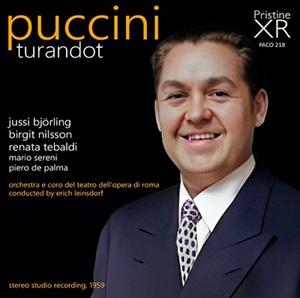
Giacomo Puccini (1858–1924)
Turandot (1926)
La principessa Turandot – Birgit Nilsson (soprano)
II principe ignoto (Calaf) – Jussi Björling (tenor)
Liu – Renata Tebaldi (soprano)
Orchestra e Coro del Teatro dell’opera di Roma/Erich Leinsdsorf
Other cast beneath review
rec. July 3-4 & 6-11 July 1959, Teatro dell’Opera di Roma, Italy
Libretto & score available online as download
Reviewed as 24-bit FLAC download
Stereo XR Remastering
Pristine Audio PACO 218 [2 CDs: 115]
This famous recording has of course been reviewed before on this website, but never in such good sound as this, Pristine’s XR remastering. In my review of the Callas set, I referred in passing to its “scrawny sound” and there were always problems with balances and distortion overload; this new issue largely addresses that.
As was the privilege of recording labels in those days, RCA had assembled a very starry cast, but neither Björling nor Tebaldi had ever actually sung their roles here on stage – and never did. This was also the only time the two leading Swedish artists, Björling and Nilsson, recorded together; Björling had already had a long career but was still in glorious voice, yet he was nearing the end of his life, his premature death hastened by alcoholism and heart failure; Nilsson was to go on to glory in the role of Turandot – as she quipped, “Isolde made me famous; Turandot made me rich”.
The quality of singing and the relative deficiency of sound is apparent from the Mandarin Leonardo Monreale’s and the chorus’s opening notes; the congestion will always be detectible, but it is much reduced here. That chorus is occasionally a bit ragged, but it is meant to be a crowd screaming bloodlust, not a bevy of courtiers and the music is deliberately brutal until the moon rises. The basses are terrific and I love the pellucid Italian articulation of the boys’ choir.
Björling is sometimes accused of being cool and detached, but he immediately throws himself into the role of Calaf with overt emotionalism. By all accounts, his tenor wasn’t the largest, but it had great penetrative quality and both the RCA engineers and the Pristine remastering ensure that he is properly heard; only Franco Corelli’s tenor could withstand being pitted against Nilsson’s laser sound, but Björling’s top C rings out triumphantly. The contrast between the deliberately quavery wavering of veteran Alessio De Paolis’ Emperor and Calaf’s manly insistence upon being allowed to undergo the riddles test, is striking; Björling’s voice rings out magnificently and “Nessun dorma” is a tour de force. Little more needs to be said about Nilsson’s assumption of the role of Ice Queen; it is definitive. She hurls out gleaming high notes like javelins.
Tebaldi’s Liù is less of a wilting violet than usual, but it is a pleasure to hear a soprano deploy her lower register and float full-voiced top notes; nor is there anything restrained about the playing and singing of the Roma orchestra and chorus. Her “Signore, ascolta!” is a thing of beauty, not as ethereal as Caballé’s but poised, touching and heartfelt, concluding on a superb sustained top B-flat. Björling picks up and sustains the mood of pathos with a melting “Non piangere, Liù!” and his own ringing top B-flat to conclude. The ensemble ending the act is thrilling and now falls more gratefully on the ear.
I read elsewhere a description of Tozzi’s bass as “woolly” – which is the last adjective I would use to characterise his warm, incisive sound. The three ministers are the best on record; we must be grateful that leading baritone Mario Sereni did not think the role of Ping beneath him and the presence of the ne plus ultra comprimario Piero De Palma is always a bonus; together with Tommaso Frascati they deliver their patter with such vigour and acuity. Their long discourse beginning Act II is a delight – witty and touching; it can pall when delivered by lesser singers.
I haven’t heard anything conducted by Leinsdorf that is less than superlative and I consider him under-rated. He was prolific and versatile and his direction here, while often remarkably released and energised, does not lack subtlety; the episode when Liù confronts Turandot with the real meaning of love is deftly handled with rubato and affection; as such, it emerges as moving, for all that the whole premise of her suicide and Calaf’s willingness to move on appears so callous. Tebaldi sings “Tu, che di gel sei cinta” beautifully; it works on stage free from too much detached, post-performance analysis. Tozzi’s tenderly vocalised lament adds to the pathos of her shocking demise. We all know that the ending is something of a desperate contrivance which even defeated Puccini, but I rather admire and enjoy Alfano’s completion, especially when it is sung by voices of this stature.
My personal preference for best studio recording remains with the Mehta/Sutherland/Pavarotti set, but this one runs a very close second, especially now that its sound has been so expertly tamed without diminishing the impact of its drama.
Ralph Moore
Availability: Pristine ClassicalOther cast:
Ping – Mario Sereni (baritone)
Pang – Piero De Palma (tenor)
Pong – Tommaso Frascati (tenor)
Timur -Giorgio Tozzi (bass)
L’imperatore Altoum – Alessio De Paolis (tenor)
Un mandarino – Leonardo Monreale (bass)
II principino di Persia – Adelio Zaganara (tenor)


















